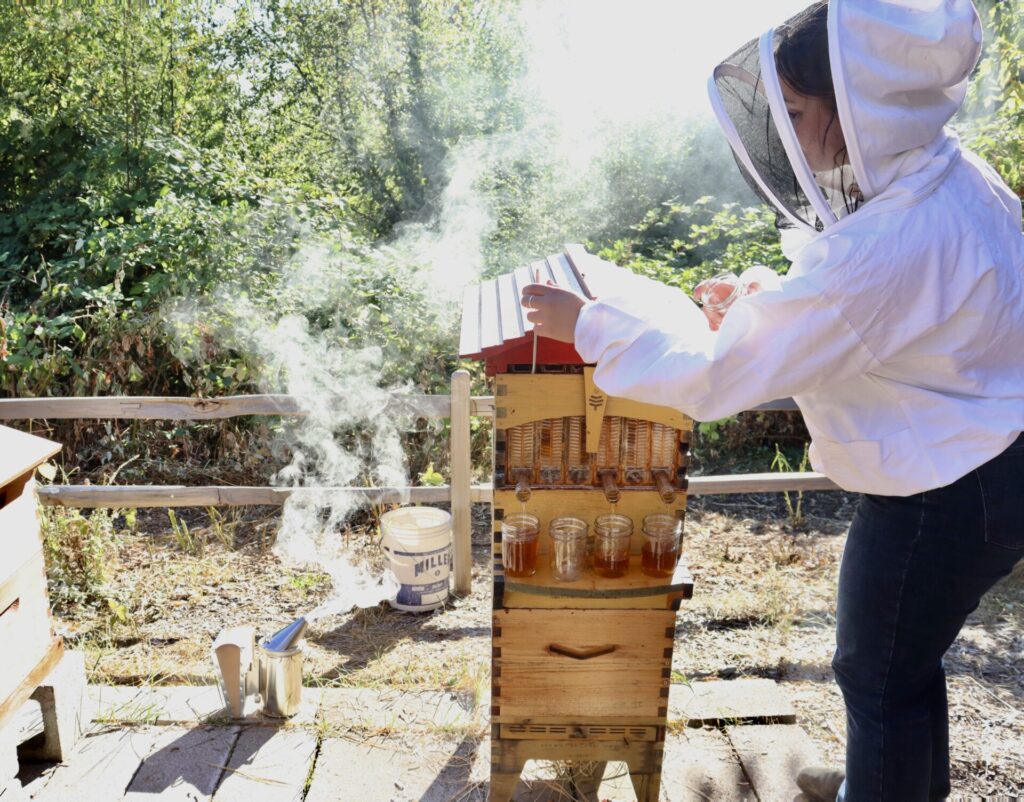
Behind the Lewis & Clark Graduate School of Education and Counseling at the bottom of a sloped lawn, right on the edge of where blackberry brambles have crept up to compete for space with the grass, lies LC’s very own bee garden. SEED Club, or Students Engaged in Eco-Defense, has been keeping bees here for several years, according to President Mateo Kaiser ’23 who is also the president of the Garden Club.
If you have ever been near a honey bee hive, you will understand the magic of watching the bees: the way they fly in and out on their daily journeys, their gentle buzzing, the way their wings glint in the sunlight and the palpable industrious energy emanating from within the hive.
Kaiser explained that the club chose that particular location for the beehives because it is south-facing, so it “gets about as much sun as you can on LC’s campus.” Bees require early morning sunlight to warm up their flight muscles and motivate them to start foraging each day. The bee garden is also out of the way of regular college activity, allowing minimal disturbance to people or bees.
Choosing a spot to put the hives was only the first step toward building a successful bee garden. Before LC, Kaiser had never kept bees, but it “was always in the back of [his] mind.”
When Kaiser got to school, there was no established beekeeping program, but it was something SEED was working on. The first colony of bees was set to arrive in the spring of 2020, which happened to be right when the COVID-19 pandemic set in. According to Kaiser, at the beginning of quarantine it was a “huge scramble” to find students living in Portland who could install and take care of the bees.
Ultimately, the bees made it through quarantine, and SEED now takes care of three beehives. They are all Flow hives, a brand that builds hives that do not need an extractor to harvest honey. Each Flow hive comes with plastic frames in a honeycomb shape, which the bees fill with nectar and gradually evaporate to reduce the water content. Then, when it is time to harvest, the beekeeper only needs to turn a crank and the honey from the plastic comb flows right out and can be directly bottled. This makes the process much quicker and less labor-intensive.
“The thinking behind the Flow hive was to cut corners on extracting,” Kaiser said.
Sept. 23 was LC’s first substantial honey harvest. Students watched the collection process from one of the Flow hives, then tasted the fresh local honey.
However, the honey harvest does not mark the end of the beekeeping season. After harvest, the SEED club plans to continue leading weekly beehive inspections at least into October, or whenever it gets too cold and wet to justify disturbing the hive. In these inspections, a leader looks within the hive for various indicators of healthy bees, keeping wary of any problem signs, while students can observe and ask questions.
Kaiser explained that the bees here at LC are Oregon-sourced, meaning the queens are mated locally so the offspring they raise are well-suited for this climate. In addition, the bees are specifically Italian honey bees, a type that tends to be gentler and less aggressive, making it easy to keep students safe during inspections and passersby to the colonies unbothered.
Overall, SEED considers the beekeeping project at LC largely successful. However, one thing Kaiser regrets was not starting with three or four hives in the first year, which would have made it easier to compare and observe differences between the colonies. Moving forward, Kaiser has some goals regarding the bee garden. First and foremost, he wants to make sure this project has longevity and can be continually supported even after he and other seniors have graduated.
“We have really robust interest from students, it just inevitably declines throughout the school year and as juniors and seniors become more busy,” Kaiser said.
One freshman who is interested in continuing work with the bee garden is Mackenzie Kier ’26. One of her favorite parts of the inspection was watching young bees hatch out of their cells for the first time. After this experience, Kier hopes to learn more about beekeeping and get more involved in the club.
“I was kind of afraid of bees, but then I went (to an inspection), and it turned out to be really exciting and fun,” Kier said.
Kaiser loves honeybees, but he also wants to incorporate more native and solitary nesting bees into SEED and help educate people about these other valuable pollinators. He is currently working on plans to build a shed next to the bee garden to house the equipment and help turn it into a more engaging space.
The Garden Club and SEED also have plans to add a more extensive pollinator garden, including native plants, solitary bee habitats, educational signage and seating areas.
“Nothing repeats with the project,” Kaiser said. “There’s always something new. We’re always moving forward.”
As Kaiser noted, there are always plenty of ways to get involved for those who are interested. Check out the instagram account @lc_seed for news and updates, and join the email list if you want more information.
Subscribe to the Mossy Log Newsletter
Stay up to date with the goings-on at Lewis & Clark! Get the top stories or your favorite section delivered to your inbox whenever we release a new issue.

Leave a Reply